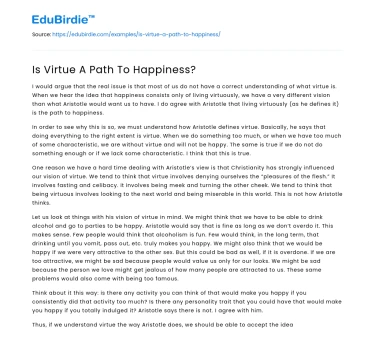I would argue that the real issue is that most of us do not have a correct understanding of what virtue is. When we hear the idea that happiness consists only of living virtuously, we have a very different vision than what Aristotle would want us to have. I do agree with Aristotle that living virtuously (as he defines it) is the path to happiness.
In order to see why this is so, we must understand how Aristotle defines virtue. Basically, he says that doing everything to the right extent is virtue. When we do something too much, or when we have too much of some characteristic, we are without virtue and will not be happy. The same is true if we do not do something enough or if we lack some characteristic. I think that this is true.
Save your time!
We can take care of your essay
- Proper editing and formatting
- Free revision, title page, and bibliography
- Flexible prices and money-back guarantee
One reason we have a hard time dealing with Aristotle’s view is that Christianity has strongly influenced our vision of virtue. We tend to think that virtue involves denying ourselves the “pleasures of the flesh.” It involves fasting and celibacy. It involves being meek and turning the other cheek. We tend to think that being virtuous involves looking to the next world and being miserable in this world. This is not how Aristotle thinks.
Let us look at things with his vision of virtue in mind. We might think that we have to be able to drink alcohol and go to parties to be happy. Aristotle would say that is fine as long as we don’t overdo it. This makes sense. Few people would think that alcoholism is fun. Few would think, in the long term, that drinking until you vomit, pass out, etc. truly makes you happy. We might also think that we would be happy if we were very attractive to the other sex. But this could be bad as well, if it is overdone. If we are too attractive, we might be sad because people would value us only for our looks. We might be sad because the person we love might get jealous of how many people are attracted to us. These same problems would also come with being too famous.
Think about it this way: is there any activity you can think of that would make you happy if you consistently did that activity too much? Is there any personality trait that you could have that would make you happy if you totally indulged it? Aristotle says there is not. I agree with him.
Thus, if we understand virtue the way Aristotle does, we should be able to accept the idea that happiness consists of living virtuously.
Did you like this example?
Make sure you submit a unique essay
Our writers will provide you with an essay sample written from scratch: any topic, any deadline, any instructions.
Cite this paper
-
APA
-
MLA
-
Harvard
-
Vancouver
Is Virtue A Path To Happiness?
(2021, September 20). Edubirdie. Retrieved December 22, 2024, from https://edubirdie.com/examples/is-virtue-a-path-to-happiness/
“Is Virtue A Path To Happiness?” Edubirdie, 20 Sept. 2021, edubirdie.com/examples/is-virtue-a-path-to-happiness/
Is Virtue A Path To Happiness? [online].
Available at: <https://edubirdie.com/examples/is-virtue-a-path-to-happiness/> [Accessed 22 Dec. 2024].
Is Virtue A Path To Happiness? [Internet] Edubirdie.
2021 Sept 20 [cited 2024 Dec 22].
Available from: https://edubirdie.com/examples/is-virtue-a-path-to-happiness/
copy






 Stuck on your essay?
Stuck on your essay?

